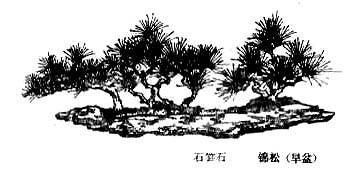Zhongyong 
 – The Doctrine of the Mean
– The Doctrine of the Mean
Confucius' grandson comments about the Way and human nature. Tr. Legge (en)
Zhongyong XXXIII. 1.
It is said in the Book of Poetry, "Over her embroidered robe she puts a plain single garment," intimating a dislike to the display of the elegance of the former. Just so, it is the way of the superior man to prefer the concealment of his virtue, while it daily becomes more illustrious, and it is the way of the mean man to seek notoriety, while he daily goes more and more to ruin. It is characteristic of the superior man, appearing insipid, yet never to produce satiety; while showing a simple negligence, yet to have his accomplishments recognized; while seemingly plain, yet to be discriminating. He knows how what is distant lies in what is near. He knows where the wind proceeds from. He knows how what is minute becomes manifested. Such a one, we may be sure, will enter into virtue.
Legge XXXIII.1.
《诗经·小雅·正月》上说:“纵使潜伏很深,其实明显得很!”所以君子扪心自问,毫无愧疚,心情一直平静。君子之所以不可以赶上,就在于他独自不为人所见所闻之处吧!
白话翻译
Zhongyong XXXIII. 2.
It is said in the Book of Poetry, "Although the fish sink and lie at the bottom, it is still quite clearly seen." Therefore the superior man examines his heart, that there may be nothing wrong there, and that he may have no cause for dissatisfaction with himself. That wherein the superior man cannot be equalled is simply this,– his work which other men cannot see.
Legge XXXIII.2.
《诗经·大雅·抑》上说:“看你单独在屋内,虽在屋角最深处,对人也无内效。”所以君子不待行动,别人也尊敬他;不待说话,别人也相信他。
白话翻译
Zhongyong XXXIII. 3.
It is said in the Book of Poetry, "Looked at in your apartment, be there free from shame as being exposed to the light of heaven." Therefore, the superior man, even when he is not moving, has a feeling of reverence, and while he speaks not, he has the feeling of truthfulness.
Legge XXXIII.3.
《诗经·商颂·烈祖》上又说:“默默祭祷,不议不争。”所以君子不用奖赏,而百姓自动劝勉;不用愤怒,百姓比腰斩之刑还害怕他。
白话翻译
Zhongyong XXXIII. 4.
It is said in the Book of Poetry, "In silence is the offering presented, and the spirit approached to; there is not the slightest contention." Therefore the superior man does not use rewards, and the people are stimulated to virtue. He does not show anger, and the people are awed more than by hatchets and battle-axes.
Legge XXXIII.4.
《诗经·周颂·烈文》上说:“道德的力量最显赫,各方诸侯奉为法则。”所以君子笃定自敬,天下自然太平
白话翻译
Zhongyong XXXIII. 5.
It is said in the Book of Poetry, "What needs no display is virtue. All the princes imitate it." Therefore, the superior man being sincere and reverential, the whole world is conducted to a state of happy tranquility.
Legge XXXIII.5.
《诗经·大雅·皇矣》上说:“我怀念天赋的美德,用不着恶声厉色。”孔子说:“用言语脸色来感化百姓,这效果是最差的。”《诗经·大雅·丞民》上说:“道德轻若羽毛。”羽毛虽轻,还有同类的东西可以比拟。《诗经·大雅·文王》上说:“上天的主宰,没有声音,没有气味。”这便是到极点了。
白话翻译
Zhongyong XXXIII. 6.
It is said in the Book of Poetry, "I regard with pleasure your brilliant virtue, making no great display of itself in sounds and appearances." The Master said, "Among the appliances to transform the people, sound and appearances are but trivial influences. It is said in another ode, 'His Virtue is light as a hair.' Still, a hair will admit of comparison as to its size. 'The doings of the supreme Heaven have neither sound nor smell.'– That is perfect virtue."
Legge XXXIII.6.
Zhongyong XXXIII. 7.
The above is the thirty-third chapter. Tsze-sze having carried his descriptions to the extremest point in the preceding chapters, turns back in this, and examines the source of his subject; and then again from the work of the learner, free from all selfishness, and watchful over himself when he is alone, he carries out his description, till by easy steps he brings it to the consummation of the whole kingdom tranquilized by simple ad sincere reverentialness. He further eulogizes its mysteriousness, till he speaks of it at last as without sound or smell. He here takes up the sum of his whole Work, and speaks of it in a compendious manner. Most deep and earnest was he in thus going again over his ground, admonishing and instructing men:–shall the learner not do his utmost in the study of the Work?
Legge XXXIII.c.

The Doctrine of the Mean – Zhongyong XXXIII – Chinese off/on – Français/English
Alias Zhong Yong, Chung Yung, Tchong Yong, The Unwobbling Pivot (Pound), La Régulation à usage ordinaire (Jullien).
The Book of Odes, The Analects, Great Learning, Doctrine of the Mean, Three-characters book, The Book of Changes, The Way and its Power, 300 Tang Poems, The Art of War, Thirty-Six Strategies
Welcome, help, notes, introduction, table.
Index – Contact – Top
